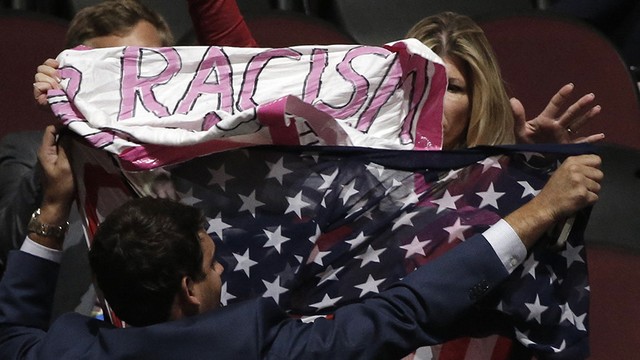By Danielle Ryan
Critics of US President Donald Trump were quick to point out that his alleged use of the term “s***hole countries” to describe Haiti and some African nations does not reflect what all Americans think of the rest of the world.
And they are correct. There are indeed millions of Americans who feel genuinely disgusted that their president has characterized less fortunate nations in such a way. But Trump’s comment forces those Americans to reckon with an uncomfortable reality: There are also millions of Americans who do share the president’s sentiments. Fox News confirmed as much when, defending Trump, a host on the channel commented that this is just how Americans “talk at the bar”.
The S***hole Principle
But let’s be honest. The “s***hole” comment is actually the least offensive expression of this reality. Because in fact, American foreign policy is built on, well, let’s call it the ‘s***hole principle’: The idea that it’s perfectly reasonable to bomb, loot, destabilize and otherwise destroy any s***hole country that’s inconveniently refusing to bow to American demands — and that the US has the singular right to act in such a manner.
In polite company, this is known as American exceptionalism and the US is referred to as “the indispensable nation”. This ideology, which, by definition, characterizes other countries as “dispensable” is supported by Americans of all political stripes. Trump just doesn’t bother with the niceties or the facade — and the facade is a crucial part of maintaining the widespread acceptability of such an imperialist ideology.
It’s a source of endless fascination and bafflement to many non-Americans that interventionist foreign policy, which reduces other nations to rubble, is repeatedly one of the few sources of bipartisan agreement — while making a racist comment is considered a step too far.
Phony media outrage
If Trump’s critics in the Democratic Party and their supporters across the United States want to get angry about their government’s treatment of less fortunate nations, there’s no shortage of former presidents at which they could direct some of their ire.
But that’s been rather difficult lately, because since Trump’s election, the media has been more than happy to wipe the US foreign policy record clean in favor of a narrative that paints the current White House inhabitant as uniquely evil or abhorrent. This kind of ‘Trumpwashing’ allows Trump’s opponents to live in a fantasy land where America’s leaders were, until January 2017, benign, peace-loving individuals who worked only for the good of humankind.
Speaking of the media, it should be noted that while many high profile figures in its ranks were quick to castigate Trump for his crude comment, their industry has been only too happy to promote the stereotype of African and Middle Eastern countries as wasteland s***holes for decades. As writer Karen Attiah put it in a piece for the Washington Post, Western media has long usedcolumn inches to treat black and brown nations like nothing but backward s***holes.
In the midst of the outrage over Trump’s comment, one American journalist piped up to remind everyone that the “true s***hole country”we should all be talking about is actually Russia. Then there’s Josh Barro, the Business Insider editor who once opined on Russia as a “dystopic s***hole since the dawn of history.” Yet Barro has emerged as an oh-so-sincere critic of Trump’s for using the same word to describe other countries.
These examples are further clarification, if any was needed, that in liberal media circles, racism and xenophobia are absolutely fine — that is, if Russians are the target. Recall also, former US Director of National Intelligence James Clapper commenting, without any backlash, that Russians are “genetically driven” to be dishonest. There is simply no way Clapper would have gotten away with such a comment had it been about any other nationality.
Rose-tinted glasses
If Americans want to use the s***hole scandal to have a conversation about how their government really treats other nations, they need to move beyond this kind of faux outrage and actually acknowledge a few home truths.
Since Haiti is a hot topic right now, they might start with reading up on how Bill and Hillary Clinton, beloved of the liberal media, played a key role in keeping that country on its knees in the aftermath of the devastating earthquake in 2010.
Pro-intervention conservatives, who find the idea of hosting even small numbers of Middle Eastern or North African refugees unacceptable, could perhaps do some light reading into their government’s role in invading or otherwise destabilizing a long list of countries in that region, too. Afghanistan, Iraq, Libya, Syria, Yemen — there’s plenty of recent history to choose from.
In response to Trump’s comment, El Salvador’s government sent the US a formal letter of protest. The country’s foreign ministry wrote that the comments were “detrimental to the dignity of El Salvador and other countries”. Meanwhile, independent journalist Jeremy Scahill tweeted a reminder of the US’s arming, training and financing of murderous paramilitaries in El Salvador in the 1980s.
“The US wanted El Salvador to be a s***hole,” Scahill wrote.
That line cuts to the heart of this issue. Too many of Trump’s critics are wearing rose-tinted glasses about the good ol’days before big bad Trump came along and ruined everything. That’s why they so easily erupt into outrage over the word s***hole but fail to see decades of imperialist and racist foreign policy as problematic.
Yes, Trump made a vulgar comment. But the real difference between him and the presidents who have come before him is that he is willing to rip off the mask of decency and reveal the truly ugly face of American leadership that lies beneath it. If nothing else, the world should thank him for that.
Danielle Ryan is an Irish freelance journalist.
13 January 2018
Source: https://www.rt.com/op-edge/415827-trump-haiti-africa-countries/

